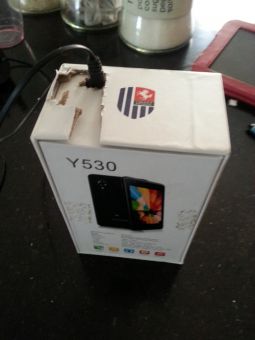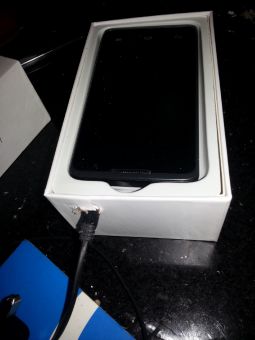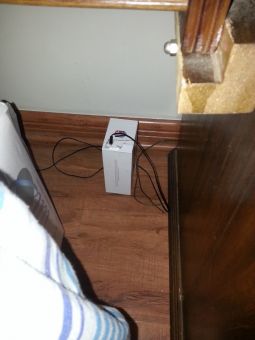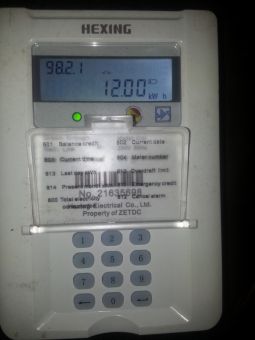I would like to share the story of why and how I built my first internet of things device. All interesting stories start with failure and frustration , my story begins at ZOL Surge startup challenge. I arrived with a pitch to build a network of sensors that would monitor and alert residents of ongoing power cuts. I failed to convince the judges of the need and feasibility of such a service.
Failing Forward
Despite the loss the idea stuck and so began a journey learning how to collect and share power-grid data.
The first breakthrough came from an unexpected avenue. I had recently started learning how to make android apps , learning about the sensors on a phone and how to manipulate them. The exercise had taught me to look beyond the interface of apps and see the interaction of sensors and data.
One day as I plugged my phone to charge I “heard” the notification sound. Wearing a huge smile on my face I plugged and unplugged my phone for 5 minutes, listening to the beep of the charging notification. I had realized my phone could monitor the state of power of an electrical outlet and as a bonus it was connected to the internet. I rushed out to buy a very cheap android phone and set to work coding. A few days later my first IoT sensor was ready.




We are scientist we measure things
It was September 2015 and long power-cuts where starting to become the norm in Zimbabwe. Taking things in their stride Zimbabweans started to joke about donating bucket loads of water to the local power company’s hydro-electric power-plant. In the midst of all this I plugged in my new sensor and waited. After a week of logging data I reviewed and graphed it. Then it hit me, the power company and I were possibly the only ones who knew exactly how long the power-cuts were lasting.

I is for internet
My sensor was working perfectly recording power-cut data, the obvious next step was to send out alerts when power came and went . I started with SMS alerts, taking it a step further I created an API that was updated live by the phone sensor. Once you have an API its use and applications are only limited by a developers imagination as shown in the video below. Pay particular attention to the laptops battery/charger indicator.
The Results
In Zimbabwe if your home has a prepaid electric meter installed , with a bit of diligent note taking you can find out how much energy you are using. At the time I lived in a household with 3 adults with an average daily usage of 17kwhrs. Using the sensor data I did some back of the envelope (napkin for my American friends) calculations. We used 17/kwh a day at $0.14 a kWh coming to $2.38 a day. In October power-cuts were averaging 16 hours a day (16/24 = 0.66) bringing down the energy cost to $0.78 (2.38 X 0.33) a day. The power company was losing $1.57 a day in potential revenue from my home. Multiplied by 800 000 households eligible for smart meters the lost potential revenue came to $1 256 640 a day.

Opportunity cost
$1 256 640 a day is a big number to wrap your head around. If you break down the cost of a power-cut into smaller lengths of times, you start to get a clearer picture of the sums involved. Each line in the next the paragraph breaks it down into i) length of time power is out , ii) the lost potential revenue and iii) what you can buy with that money;
- 1 min , $1 405 , fully paid premium satellite TV (DStv) for a year and a half
- 1 hour , $82 320 , brand new Jeep Grand Cherokee SUV
- 1 day , $1 317 120 , a mansion in an exclusive neighbourhood like Borrowdale Brooke
- 1 week ,$9 219 840 , a months salary for 18 000 civil servants
- 1 month , $36 879 360 , build two 130 bed hospitals
- 1 year , $442 552 320 , put a down payment for a new power generation plant
Going forward
The interconnected rise of the internet and mobile phones was the precursor of the age of the internet of things (IoT). For the west the promise of the internet of things were fridges that would automatically replenish your milk. A wonderful dream for those who came from lands bathed in internet and had never experienced load shedding. In Africa as we so often do we adapted the same tools and technology to tackle our immediate problems. Lumkani.com is a perfect example of this, their device saves lives by warning of nearby shack fire.
Though few and far between IoT, companies exist in Zimbabwe with most focusing on security and health. Because of the usual suspects of constraints, IoT use has had a slow uptake. I believe with a lot of will and a little bit of ingenuity uptake can be better. What started out as an idea led to a prototype that shed light on what the real cost of a power-cut is. Such an ability was impossible only a few years back.The technology has not reached its fullest potential and if we are willing to look beyond the usual sectors we could not only learn more but create business literally out of thin air.
As a country we are entering a stage of rapid development, IoTs and the data they produce can help highlight the areas which need immediate attention. The future of Zimbabwe lies in part in its ability to leverage IoT technology to gather data, analyse it to not only make informed decisions but accurately measure its progress.
About author
Harvey Binamu is a developer, who is currently working for BLNGA. This a startup which works with Big data and Artificial Intelligence and does collaborate work with organisations in Civic Activism, Transportation and Investment industries. hbinamu@gmail.com

9 comments
Good article. Good luck on your future work!
Good work and readinh as well. Im into farming and l strongly believe IoT have future there. I want to put irrigation system controlled by sensors in or around the fields capfuring moisture and triggering pumps into action.
Still setting up initial infrastructure…
Thank you , Your project sounds interesting , any plans on what data you will collect and what you will do with it .If you dont mind i d love to follow your progress as you go.
Nice. The solution is so simple but the insights are amaizing.
I know Its crazy how sometimes the simplest things have the largest impact
Excellent stuff
Thank you
Thank you, very insightful article. It goes to show that with the right kind of thinking, incredible things can be achieved with simple solutions.
This Article epitomises what Techzim used to be about when it first started out – before delving much into politics and sort of newspaper reporting. Not that this is a bad thing but I think we need more stuff like this, stuff that generates ideas and readers interest and therefore input. I loved TechZim because I thought this was the space where people can get entrepreneurial ideas share knowledge. Dare I go further and say perhaps we are precious with our ideas and dont want to share in case some one might steal them? But I say if it’s your talent/passion no one can really take it away from you.
None the less great article. Perhaps we need more guest writers too!
Thank you . Maybe its the right kind thinking but i believe that is the result of my environment .